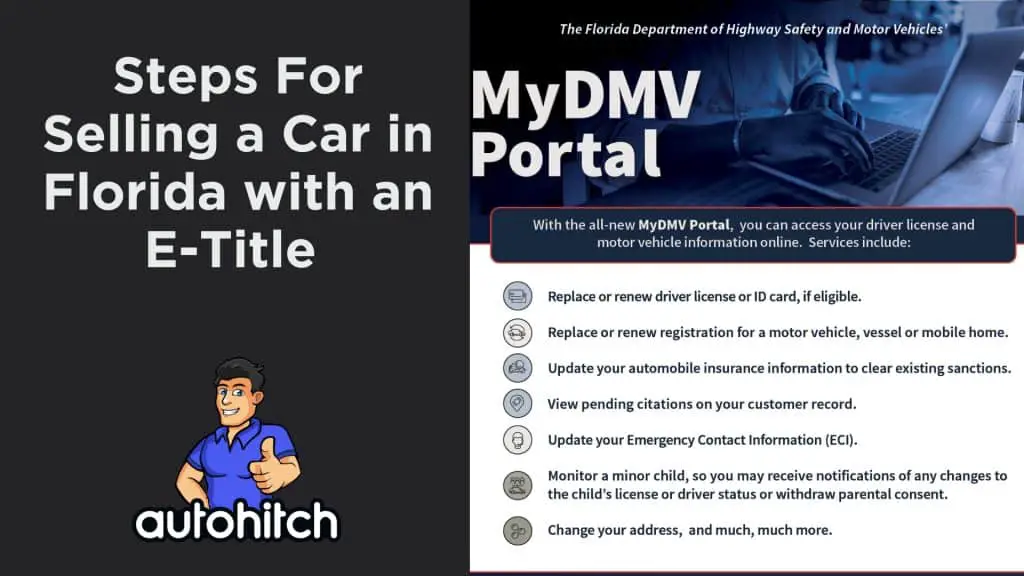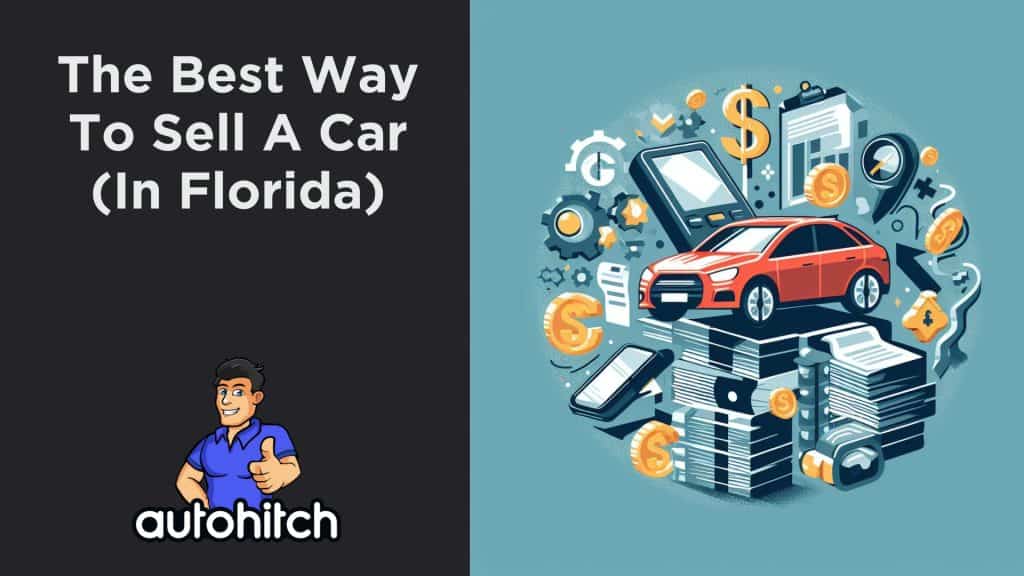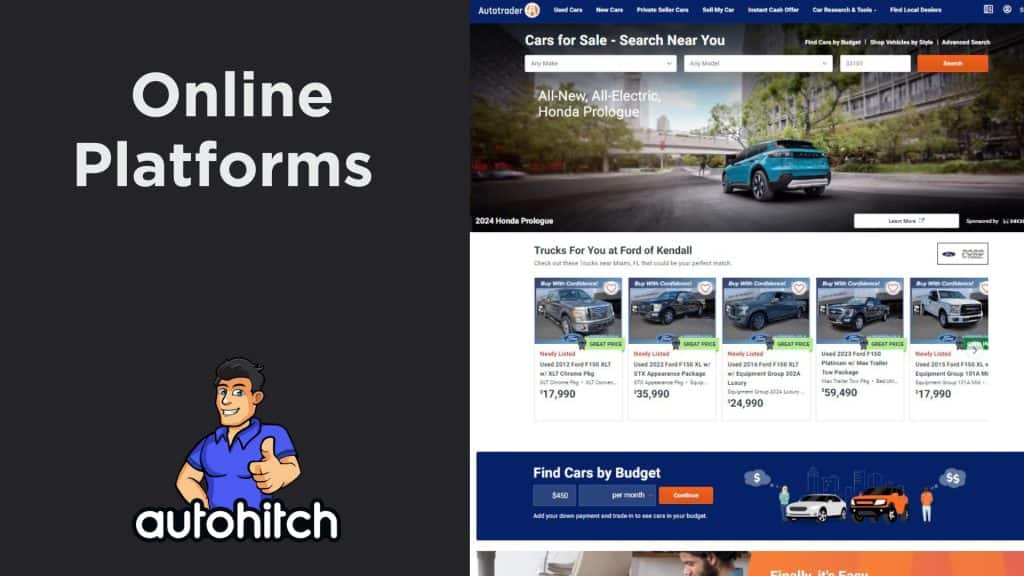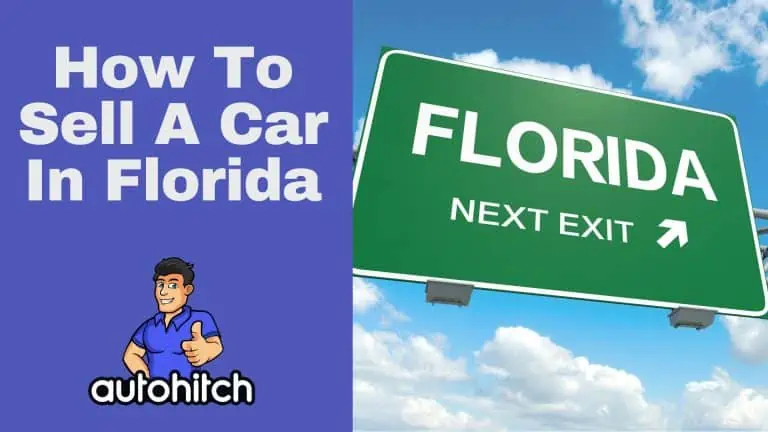How To Sell a Car in Florida (2024 Tips)
As a former licensed car dealer in the state, I understand the intricacies of how to sell a car in Florida.
Whether you’re a seasoned seller like me or a first-timer, this article will provide you with everything you need to know about how to sell a car privately in Florida.
Relevant Articles For this Topic:
- How to Transfer a Car Title in Florida
- How to Transfer a Car Title to a Family Member in Florida
- Selling a Car With a Lien in Florida
- Selling a Car with High Mileage
- How To Junk A Car In Florida
- Lemon Law Florida Used Car
- Dealer Fees In Florida
- Florida Repossession Laws
- Lease Buyout Title Transfer Florida
- Does Broward County Have Same Day Title?
Table of Contents
What Paperwork Do I Need to Sell a Car Privately in Florida?
The Florida Department of Highway Safety and Motor Vehicles (FLHSMV) requires several documents for a private car sale. These include:
| Document | Description |
|---|---|
| Vehicle Title | The official title certificate proving ownership. If lost, you’ll need to apply for a duplicate title using form HSMV 82101. For electronic titles, both buyer and seller must be present. |
| Notice of Sale (HSMV 82050) | This notifies the DMV you are no longer the owner as of the sale date. Filing this protects you from liability after the sale. |
| Bill of Sale | While not legally required, it acts as a receipt documenting the sale details for both parties. Getting it notarized is recommended. |
| VIN/Odometer Verification (HSMV 82042) | Required if the vehicle was never previously titled in Florida. Verifies VIN and odometer reading by owner and an authorized party like a notary, law enforcement, DMV inspector, etc. |
| Lien Release Letter | If there is an existing lien on the vehicle, you’ll need this letter from the lienholder proving it has been satisfied before you can sell the car. |
| Temporary Tag | If your plate is transferred to a new vehicle, you’ll need a temporary “demonstration only” tag to allow test drives. Requires proof of insurance. |
The specific paperwork can vary, but having the vehicle title, filing the Notice of Sale, potentially getting a VIN verification, and handling any lien release are among the key documents for properly transferring ownership in a private sale in Florida.
Pay Off Any Liens
If there’s an existing lien or loan on the car, you’ll need to satisfy the lien before you can legally sell the vehicle.
Once the lien is satisfied, the lienholder will complete a lien satisfaction form and send it to the Florida Department of Highway Safety and Motor Vehicles.
Once the state has processed the release, you will be able to request a replacement title, which you will need because you must have a physical title to sign that reflects no liens.
How Long Does It Take to Get a Title in Florida?
The initial title will come by Mail in 7-10 days, and on this initial title, you cannot get it printed the same day locally. You must wait for this title by mail.
BUT—If you had no liens and were simply requesting a duplicate title, it can be printed the same day for a fee.
Vin Verification Process
In Florida, there are situations where a vehicle identification number (VIN) verification is required when registering or titling a vehicle:
- When registering or titling an out-of-state vehicle in Florida for the first time.
- When registering or titling a vehicle that has no existing record with the Florida DMV.
- When registering or titling a vehicle that has had its body configuration changed, requiring a new body type model (BTM).
The VIN verification process involves a physical inspection of the vehicle to ensure the VIN matches the documentation and records. Here are the key points about how the VIN gets verified in Florida:
- The vehicle must be physically present for the inspection.
- The VIN is checked in at least two locations on the vehicle – typically under the windshield and on the driver’s side door jamb.
- The inspection must be performed by an authorized party, which includes:
- A commissioned Florida notary public
- A Florida law enforcement officer
- A Florida DMV compliance examiner/inspector
- A military police officer
- A Florida licensed dealer
- If a notary public performs the VIN verification, they must complete Part B of the form HSMV 82042 and notarize it, certifying they physically inspected the vehicle and the VIN matches the form.
What To Do With Tag and License Plates
Before Sale: Temporary Tag
As a private seller, I would recommend you apply for a temporary tag for test drives only. The reason why is that liability issues become complex if someone crashes your car while driving under your tag, and you certainly dont want to be held liable for someone else’s driving.
Why You Should Use a Temp Tag
- Liability protection – If the prospective buyer gets into an accident or receives a traffic violation during the test drive, it will be associated with the temporary tag and not your personal vehicle registration/tag. This protects you from potential liability issues.
- Insurance coverage – The temporary tag requires you to have insurance coverage specifically for the vehicle being sold during the demonstration period. Using your personal tag may not extend your insurance coverage properly.
- Clearly distinguishes seller vs. buyer – Having a separate temporary tag makes it clear to law enforcement that you are the seller and the person test driving is a prospective buyer, avoiding any confusion.
How to Get a Temporary Tag in Florida: https://www.flhsmv.gov/pdf/proc/rs/rs-31.pdf
After Selling Your Car: Transfer Title or Turn in Your Tag
Florida law requires the seller to remove the license plate from the vehicle immediately after the sale. You are permitted to transfer the tag to a new vehicle, but if you do not, you MUST return it to the DMV or face fines and possible license suspension. Source: Florida Statute.
How to Sign Over a Title
Properly signing over a title is often overlooked but is extremely important because it can protect you from fraud, such as a buyer trying to jump the title.
Our in depth guide on filling out a car title: How To Sign Over A Car Title
File a Notice of Sale To Transfer Liability
Another step most people skip, which I highly recommend, is to file a notice of sale as the seller. This tells the state that you are no longer the owner of the vehicle and avoids potential liability issues like if the buyer tried to jump the title or doesn’t register the vehicle within the required 30 days.
Note: Failure to file the Notice of Sale can result in suspension of your driver’s license if the new owner does not transfer the title within 30 days.
Complete a Bill of Sale
Along with a Notice of Sale you should also complete a Bill of Sale. These are different because the Notice of Sale transfers the liability and registration responsibility, and the Bill of Sale legally transfers ownership.
This is extremely important for the buyer because as they drive away, they do not have a title, and the Bill of Sale will be the only proof they legally purchased the vehicle if pulled over by police.
Printable Bill of Sale:
You can find a bill of sale form on the Florida Highway Safety and Motor Vehicles website. Both the buyer and seller must sign this document, and it’s a good idea to make copies for both parties.
The bill of sale should include the following:
- The selling price.
- Odometer reading.
- And the buyer and seller’s information.
Selling a Car to Someone Out of State
If you’re selling a car in Florida to someone out of state, the process remains largely the same. The key difference is that the buyer will need to register the vehicle in their home state after the sale.
As the seller, you should still complete a Notice of Sale, especially because the communication between state DMV systems isn’t always reliable.

Steps For Selling a Car in Florida with an E-Title (Title Transfer)
The process for selling a car privately in Florida differs slightly depending on whether you have an electronic title (e-title) or a paper title certificate. Here are the key differences:
With an Electronic Title (e-title):
- There is no paper title document to hand over physically.
- You must access your e-title through the Florida DMV’s website or a DMV service center.
- Follow the prompts to electronically reassign/transfer the e-title to release your interest.
- Provide the buyer with documentation proving you released your e-title interest.
- The buyer takes that documentation to the tax collector to have the e-title transferred into their name.
Documents (Online) Required To Transfer E-Title in Florida: HSMV 82994 and/or HSMV 82092
With a Paper Title Certificate:
- You must physically hand over the paper title to the buyer after properly reassigning the ownership section on the title.
- Make copies of the front and back of the reassigned title for your records before giving it to the buyer.
- The buyer will then take the reassigned paper title to the tax collector’s office to complete the transfer into their name.
Other differences:
- With e-titles, there is less risk of losing or damaging a paper title document.
- Paper titles may require an odometer disclosure, while e-titles have odometer readings stored electronically.
- Fees may differ slightly when transferring an e-title versus a paper title.
How To Order a Paper Copy of Your E-Title
There might be a few reasons why you still need a paper title in order to sell your car or transfer ownership. Here are just a few I can think of off the top of my head:
- Out-of-State Transactions
- International Transactions
- Lending Institutions
- Private Sales
- Gift or Inheritance
- Peace of Mind
- Lost or Unavailable Electronic Records
- Lien Release
If you fall into any of these categories or are simply just a fan of tradition, here is how you can obtain a paper copy of your E-Title to sell a car in Florida:
- Check Your Title Status:
- First, ensure that all liens (debts) on your vehicle have been satisfied. If they have, you can convert your electronic title into a paper format.
- Choose a Method to Convert Electronic Title to Paper:
- Online:
- Visit the MyDMV Portal on the FLHSMV website.
- Request the electronic title to be converted to paper.
- Pay a fee of $4.50.
- The paper title will be mailed to your address on record. It usually arrives in 3-4 weeks.
- Note: You can’t print the title at home or pick it up from a Florida county tax collector’s office after completing the online process.
- By Mail:
- Send the following to your local Florida county tax collector’s office:
- Photocopy of a valid picture ID.
- Written request to print the electronic title.
- Payment of $2.50 for the title printing.
- The paper title will be mailed to you and typically takes 3-4 weeks to arrive.
- Send the following to your local Florida county tax collector’s office:
- In-Person (Fast Title):
- If you’re in a hurry, visit a Florida county tax collector’s office or service center.
- Request a “fast title” which is printed and given to you the same day.
- There’s an additional fee of $10 for this expedited service.
- Online:
- Selling Your Car:
- Once you have the paper title, you can use it to transfer ownership to the buyer.
- FLHSMV recommends conducting the sale and transfer in a Florida county tax collector’s office or motor vehicle service center. This ensures your name is removed from the vehicle ownership record immediatly.
Source: https://www.flhsmv.gov/safety-center/consumer-education/selling-vehicle-florida/
Preparing your Car For Sale
Before you list your car online or place a for sale sign on the windshield, there are a few things you need to do.
First, make sure your car is in good condition, or as close as you can get it to good condition.
What To Repair and Not To Repair
Preparation Tip: Don’t go overboard with expensive repairs because you won’t get that money back from the sale. Car buyers find replacing general wear and tear items like tires or batteries a nuisance, and most people like buying cars they can just get in and drive.
At the same time, if your car needs major repairs, it is true that you will turn off most buyers, but from my experience, buyers don’t care to pay more to cover your major repairs because it’s too easy to find the same car somewhere else that isn’t charging a higher price to cover recent repairs.
Do Repair or Replace
- Brakes (Only pads unless the rotors are in really bad shape)
- Tires (Only if they are so bad they’re unsafe)
- Fluids
- Battery
- Lights
- Filters
- Get the car professionally detailed
- Minor dents and Scratches (that you can take out with scratch remover)
Don’t Repair or Replace
- Transmission
- Engine
- Suspension
- Air Conditioning
- Major body work like collision damage, rust, or a full paint job
The only time I would make an exception and actually spend money on a major repair is if you need to sell the car quickly.

The Best Way To Sell A Car (In Florida)
There are a few methods I can safely rate as the best ways to sell a car in Florida, so let’s dive in:
Carmax (Sell my Car):
Typically, I don’t advise people to sell their car to a dealer because they’re not going to get anywhere near the actual retail value.
But when it comes to the prices I have seen Carmax offer people for used cars, it’s absolutely worth a visit to get a quote.
Important to remember: I say this a lot, but it rings true for the Carmax Sell My Car service. There are certain cars that are in high demand, such as minivans or work trucks. Carmax can pay close to retail on those models because they know they can still turn a great profit. However, if you’re selling something like a Honda Civic or a car with high mileage, you’re not as likely to get as good of an offer.
Tip: While you’re getting your Carmax offer, visit a couple of other well-known auto buyers like Auto Buy, or Givemethevin and get competing offers. More than not, you can use a higher offer to get one of the other dealers to beat it.
Bonus: When you trade in or sell to a dealer you are saving all sorts of time and hassle not dealing with the general public, so although you might get less money in the end, if your time is valuable, it just might be worth it.
Facebook Marketplace:
I have discussed the Facebook Marketplace for cars before, and its still effective.
As the platform has grown, it has become a much safer replacement to craigslist as a local peer to peer method of selling a car, and that’s due to the fact that because people need a facebook profile to sell, you can easily see if the seller opened their account last week or 10 years ago, and that certainly ads a layer of trust.
Relevant Article To Read: Car Scams On Facebook

Online Platforms:
Websites like Edmunds, Autotrader, Cars.com, and the newest addition, PrivateAuto offer your standard platforms where you can list your car for sale. These sites allow you to reach a wide audience of potential buyers, especially when you post a listing on each of these sites.
However, most car listing services come at a cost, and you may need to spend time communicating with potential buyers, arranging test drives, and handling paperwork.
Next, gather all the necessary paperwork. The primary document you’ll need is the car title.
Advertising Laws in Florida
In Florida there are some laws about how a private seller can and cant advertise their car which you should know:
- Florida law prohibits parking any vehicle on public rights-of-way or on private property solely for the purpose of advertising/displaying the vehicle for sale, unless you have a dealer’s license. This practice is known as “curbstoning“.
- Florida law presumes that any person who buys, sells, offers for sale, or deals in three or more motor vehicles in a 12-month period is considered a motor vehicle dealer, requiring a dealer’s license.
- Some local municipalities like Miami-Dade County have additional ordinances prohibiting the display of vehicles with banners/advertising solely for that purpose on private property.
Hopefully I have answered all your questions about selling a car in Florida, but if I haven’t, please use the comment section below to add your additional questions, and thanks for reading!



4 Responses
Last time I sold a car I insisted on cash. The selling price was in the $25,000 range. They buyer had trouble getting that much cash from his bank on short notice, then I had to deposit it and show proof of where it came from. Is there a better way? Certified check? Cashier’s check? Bank transfer of some sort? Thank you.
3VWC57BU5KM250807…..free trade estimate please
How does the buyer pay me? Paying cash may be hard for them, since carrying $15,000 cash around may not appeal to them. Is a cashier’s check OK? Is a personal check OK?
Yes, a cashiers check is perfectly fine and essentially serves as cash, however you should arrange to exchange and cash the check together to avoid any lack of trust or opportunities for mistakes.